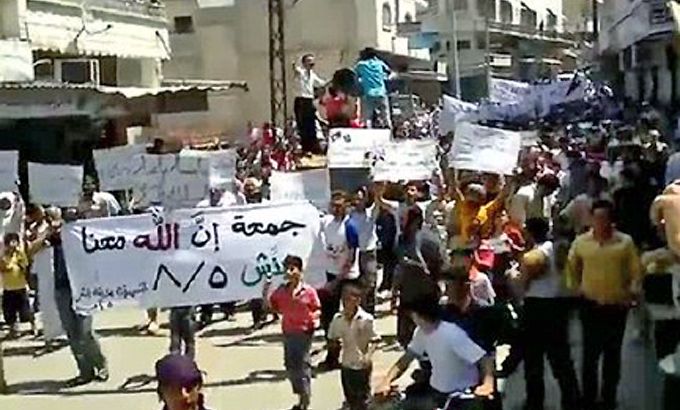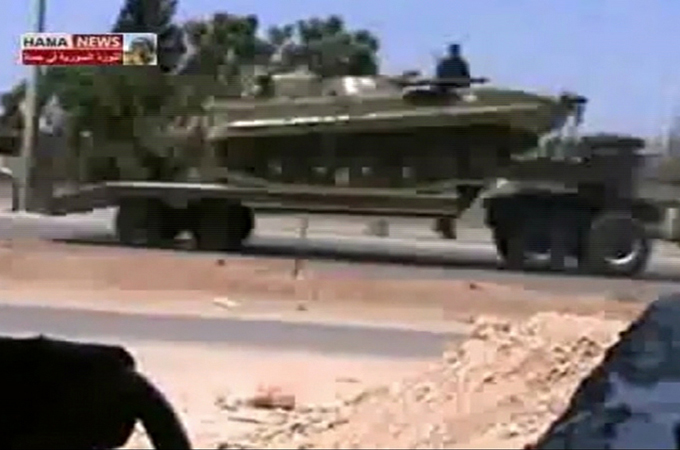Saudi Arabia calls for Syrian reforms
King Abdullah recalls ambassador from Damascus as activists report renewed artillery fire in the city of Deir ez-Zor.

Saudi Arabia’s king has condemned a brutal crackdown on protests in Syria, recalling the country’s ambassador to Damascus and calling on the Syrian government to implement political reforms.
“What is happening in Syria is not acceptable for Saudi Arabia,” King Abdullah said in a written statement on Monday.
“Syria should think wisely before it’s too late and issue and enact reforms that are not merely promises but actual reforms,” he said. “Either it chooses wisdom on its own or it will be pulled down into the depths of turmoil and loss.”
The Saudi monarch’s comments came a day after the Gulf Co-operation Council urged Syria to “end the bloodshed” and the Arab League, which had been silent since the uprising began, said it was “alarmed” by the situation and called for the immediate halt of all violence.
Later in the day, Kuwait announced it had decided to recall its ambassador from Damascus for “consultations”.
“No one can accept the bloodshed in Syria… The military option must be halted,” Foreign Minister Sheikh Mohammad al-Sabah told reporters.
Hours after the statement from the Saudi king, Syrian activists said the eastern city of Deir ez-Zor came under new artillery fire.
The Syrian Observatory for Human Rights reported that security forces had shot dead a mother and her two children fleeing the assault.
“The woman and her two children were trying to flee the Huweika district for somewhere safer when they were targeted by a security patrol,” the group said, citing residents.
Other activists said security forces carried out search operations, arresting a number of people, after using heavy machine guns.
“The army opened up with heavy machine guns on al-Joura district. Security forces then launched a search sweep, terrorising residents,” AFP quoted an activist in the city as saying.
Troops also entered Maarat an-Numan in the northern province of Idlib at dawn on Monday, according to opposition activists.
“Forces entered the city from its eastern side and they are preventing the residents from entering or leaving the city,” the Local Co-ordination Committees said in a statement.
Bloody week
Some activists say more than 300 people have died in the past week, the bloodiest in the five-month uprising against Assad.
Troops raided Deir ez-Zor on Sunday, reportedly killing at least 50 people.
“Humanitarian conditions in the city are very bad because it has been under siege for nine days,” an activist in the city said. “There is lack of medicine, baby formula, food and gasoline. The city is totally paralysed.”
 |
| Arab League has said it is “alarmed” by the situation in Syria and called for an end to violence [Reuters/YouTube] |
Syria’s state news agency cited an official military source dismissing claims that the army was shelling Deir ez-Zor, insisting that up to Sunday, no tanks had entered the city.
However, “the source pointed out that some army units were commissioned to remove roadblocks set up by the armed terrorist groups at the city’s entrances”, SANA reported.
Commenting on the recalling of the Saudi ambassador, Ali al-Ahmed, director of the Institute for Gulf Affairs in Washington, told Al Jazeera that the move was “a watershed moment” and “foretaste of things to come”.
“Saudi Arabia has been supporting elements in the Syrian uprising since the beginning, but now this role has been made public. It was secret until recently, now the Saudis are basically increasing the heat on the Syrian regime and this will result in an increase in clashes and protests inside Syria,” he said.
“The Syrian regime is really scared of losing Saudi Arabia as a friendly nation.”
However, Ahmed said Saudi Arabia was “not in a position to give such advice to Syria in terms of reform”.
“Saudi Arabia itself lacks these reforms and has invaded Bahrain to stop a revolution and so it does not have that legitimacy. However, Saudi believes this is the right moment to publicly intervene and give the uprising a huge boost because they now see the success of this uprising to be real, especially after the Turkish position, the GCC and Arab League statements, all of which were preludes to the Saudi position,” he said.
‘Power struggle’
Joseph Keshishian, an expert on Gulf countries, said Riyadh’s decision to step up pressure on the Syrian regime was sparked in part by the growing power struggle in the region between Saudi Arabia and Iran.
“Obviously Iran is providing a great deal of assistance to the Syrian government,” he told Al Jazeera.
“The Saudis are reacting to the incursions that the Iranian government seems to be perpetually engaged in throughout the heartland of the Arab world.”
He also said the Saudi condemnation was made in reaction to mounting public frustration in the Gulf kingdom over the Syrian government’s efforts to crush peaceful protests.
“The Saudi government is essentially starting to realise that unless they take the leadership position against the Syrian government within the GCC, the public will turn against them.
“The Saudis are very aware and conscious of public opinion inside the country.”
The government’s crackdown on protesters demanding political reforms and an end to the Assad family’s 40-year rule has left more than 1,700 dead since March, according to activists and human rights groups.
Assad’s government disputes the toll and blames a foreign conspiracy for the unrest, which at times has brought hundreds of thousands of protesters into the streets.
The regime intensified the crackdown a week ago on the eve of Ramadan, the holy month in which many Muslims fast from dawn to dusk, then eat meals and gather in mosques for nightly prayers. The government has been trying to prevent the large mosque gatherings from turning into more anti-government protests.
Growing Arab criticism
Jordanian Foreign Minister Nasser Judeh was quoted by Jordan’s official Petra News Agency on Monday describing the escalation in violence as “disturbing.” He urged the regime to follow through on promised reforms, but added that Amman does not interfere in Damascus’ affairs.
In Cairo on Sunday, Arab League Chief Nabil El Araby called on Syrian authorities to “immediately stop all acts of violence and security attacks and for a speedy adoption of necessary steps in this regard to preserve the national unity.”
Turkey, which borders Syria and until recently was a close ally and a major trade partner, said it would send its foreign minister to Damascus on Tuesday to deliver a strong message against the crackdown.
US Secretary of State Hillary Clinton later asked Turkey’s foreign minister to press Syria to “return its military
to the barracks,” during his visit.
Assad has brushed off months of criticism and sanctions, blaming armed gangs for the violence, and his government’s reaction to Turkey’s criticism was quick.
State-run TV quoted Assad adviser Bouthaina Shaaban as saying that Turkey’s foreign minister “will hear stronger words because of Turkey’s stance that did not condemn until now the brutal killings of civilians, members of military and police”.